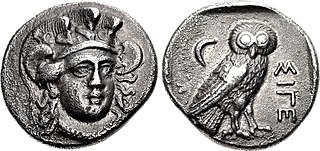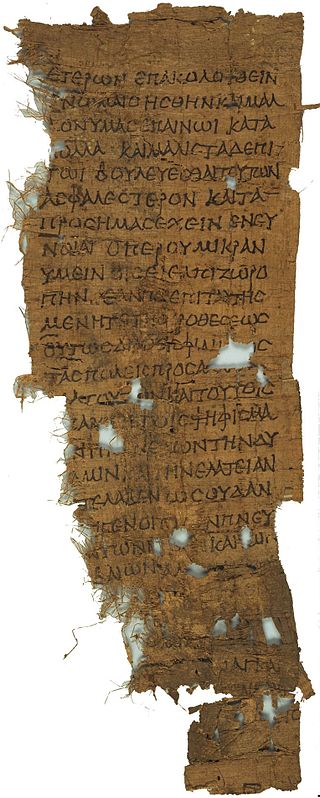Year 341 BC was a year of the pre-Julian Roman calendar. At the time it was known as the Year of the Consulship of Venno and Privernas. The denomination 341 BC for this year has been used since the early medieval period, when the Anno Domini calendar era became the prevalent method in Europe for naming years.

Demosthenes was a Greek statesman and orator in ancient Athens. His orations constitute a significant expression of contemporary Athenian intellectual prowess and provide insight into the politics and culture of ancient Greece during the 4th century BC. Demosthenes learned rhetoric by studying the speeches of previous great orators. He delivered his first judicial speeches at the age of 20, in which he successfully argued that he should gain from his guardians what was left of his inheritance. For a time, Demosthenes made his living as a professional speechwriter (logographer) and a lawyer, writing speeches for use in private legal suits.
This article concerns the period 349 BC – 340 BC.
A philippic is a fiery, damning speech, or tirade, delivered to condemn a particular political actor. The term is most famously associated with two noted orators of the ancient world: Demosthenes of ancient Athens and Cicero of ancient Rome. The term itself is derived from Demosthenes's speeches in 351 BC denouncing the imperialist ambitions of Philip of Macedon, which later came to be known as The Philippics.
Cardia or Kardia, anciently the chief town of the Thracian Chersonese, was situated at the head of the Gulf of Melas. It was originally a colony of the Milesians and Clazomenians; but subsequently, in the time of Miltiades, the place also received Athenian colonists, as proved by Miltiades tyranny. But this didn't make Cardia necessarily always pro-Athenian: when in 357 BC Athens took control of the Chersonese, the latter, under the rule of a Thracian prince, was the only city to remain neutral; but the decisive year was 352 BC when the city concluded a treaty of amity with king Philip II of Macedonia. A great crisis exploded when Diopeithes, an Athenian mercenary captain, had in 343 BC brought Attic settlers to the town; and since Cardia was unwilling to receive them, Philip immediately sent help to the town. The king proposed to settle the dispute between the two cities by arbitration, but Athens refused. Demosthenes, the famous Greek patriot and orator, spoke on this very matter to the Athenian Senate in 341 BC his "Oration On The State Of The Chersonesus":
Our present concernment is about the affairs of the Chersonesus, and Philip's expedition into Thrace...but most of our orators insist upon the actions and designs of Diopithes...which, if one moment neglected, the loss may be irreparable; here our attention is instantly demanded...shall Philip be left at full liberty to pursue all his other designs, provided he keeps from Attica; and shall not Diopithes be permitted to assist the Thracians? And if he does, shall we accuse him of involving us in a war?...none of you can be weak enough to imagine that Philip's desires are centered in those paltry villages of Thrace...and has no designs on the ports...arsenals...navies...silver mines, and all the other revenues of Athens; but that he will leave them for you to enjoy...? Impossible! No; these and all his expeditions are really intended to facilitate the conquest of Athens....let us shake off our extravagant and dangerous supineness; let us supply the necessary expenses; let us call on our allies...so that, as he hath his force constantly prepared to injure and enslave the Greeks, yours too may be ever ready to protect and assist them.
Diopeithes was an Athenian general, probably father of the poet Menander, who was sent out to the Thracian Chersonese about 343 BC, at the head of a body of Athenian settlers or cleruchs.
Cersobleptes, was son of Cotys I, king of the Odrysians in Thrace, on whose death in September 360 BC he inherited the throne.

Chares of Athens was a 4th-century BC Athenian military commander (Strategos), who for a number of years was one of Athens's foremost commanders. He was also a well connected politician enabling him to procure the commands he desired, commands he primarily used to enrich himself and his adherents.
The Olynthiacs were three political speeches, all delivered by the Athenian statesman and orator Demosthenes. In 349 BC, Philip II of Macedon attacked Olynthus, which at the time was an ally of Athens. In the Olynthiacs, delivered in 349 BC, Demosthenes urged Athens to help Olynthus.
The "First Philippic" was delivered by the Athenian statesman and orator Demosthenes between 351 BC-350 BC. It constitutes the first speech of the prominent politician against Philip II of Macedon. A philippic refers to a type of speech that is negative in tone and one that is comparable to a rant or a tirade.
The "Second Philippic" is an oration that was delivered by the Athenian statesman and orator Demosthenes between 344–343 BC. The speech constitutes the second of the four philippics the orator is said to have delivered.
Peace of Philocrates is the name given to the peace treaty concluded in 346 BC between Athens and Macedon under Philip II. Philocrates was the name of the main Athenian negotiator of the Treaty.
"On the Chersonese" is a political oration delivered by the Athenian statesman and orator Demosthenes in 341 BC. A short time later Demosthenes delivered one of his most famous speeches, the Third Philippic.

"On the Crown" is the most famous judicial oration of the prominent Athenian statesman and orator Demosthenes, delivered in 330 BC.
"On the Liberty of the Rhodians" is one of the first political orations of the prominent Athenian statesman and orator Demosthenes. It is generally dated to 351/0 BC, shortly after the First Philippic, and constitutes one of the initial political interventions of Demosthenes.
Demosthenes's "Funeral Oration" was delivered between August and September of 338 BC, just after the Battle of Chaeronea. It constitutes along with the Erotic Essay the two epideictic orations of the prominent Athenian statesman and orator, which are still existent.
"On the Peace" is one of the most famous political orations of the prominent Athenian statesman and orator Demosthenes. It was delivered in 346 BC and constitutes a political intervention of Demosthenes in favor of the Peace of Philocrates.
"On the Halonnesus" is a political oration attributed to the prominent Athenian statesman and orator Demosthenes.
"On the False Embassy" is the name of two famous judicial orations, both delivered in 343 BC by the prominent Athenian statesmen and fierce opponents, Demosthenes and Aeschines.
The Fourth Philippic is a speech attributed to the Athenian statesman and orator, Demosthenes and given in 341 BC. It constitutes the last of the four philippics. Modern scholars, however, consider that the speech is not Demosthenes' work and may be attributed to Anaximenes of Lampsacus who frequently wrote imagined dialogues or speeches for real figures. If it was a genuine Demosthenic speech, it is likely that it was issued in pamphlet form rather than actually delivered as a speech.



